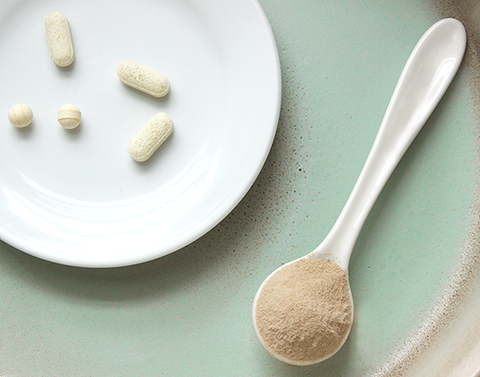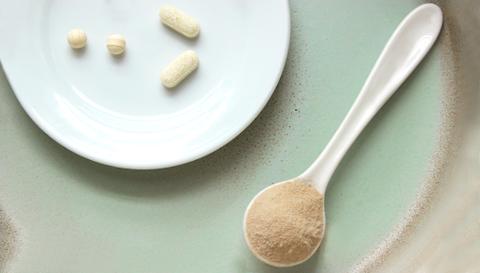
Probiotics are getting a lot of positive press these days, and for very good reasons. These fascinating beneficial microbes are essential for helping to maintain our health and supporting our immune system.
As research around the life-enhancing functions performed by our friendly flora continues to take center-stage, it would be remiss to not give due credit to the essential role that prebiotics play in maintaining our overall health by sustaining our probiotic bacteria.
At first glance, a single vowel seems to be the only distinction between the two words, but probiotics and prebiotics are actually quite different. You see, probiotics are living organisms, while prebiotics are indigestible fibers that provide nourishment for the probiotics—much like fertilizer for a garden. While probiotics often get all the attention, prebiotics also deserve their own time in the spotlight.
Before we dive into just how important prebiotics are to your well-being and vitality, let’s take a look at how probiotics work to keep you feeling your best.
Probiotics 101
Did you know that you are actually more microbial than human? Yes! We play host to trillions of microbes that live in and on our body, and collectively they make up our microbiome.
Comprising thousands of different species, the bacteria that live within us (most of whom reside in our gut) provide us with an astonishing number of life-supporting benefits, from helping to produce important vitamins and enzymes to supporting our digestion, metabolism, moods, and immune system.
The unique composition of a person’s microbial mix begins to develop in the womb and changes through the years depending on age, diet, the environment, and many other factors, but a healthy microbiome should always consist of at least 85% beneficial bacteria and only 15% (or less) of the inhospitable microbes that can create issues.
Unfortunately, this bacterial balance is under constant threat from many factors in our modern lifestyles, such as antibiotics both in our food and as medicine, pesticides, overzealous hygiene habits, antibacterial cleaners, and toxins and contaminants in the environment. Even stress and the aging process can dwindle the numbers of friendly flora in our gut.
The good news is that taking a daily probiotic supplement can help replenish your delicate microbial ecosystem, so the beneficial bacteria can stay in the majority and perform at their peak. The even better news? By ensuring you have plenty of prebiotics in your life, you can further support your colonies of good guys so they can, in turn, support your health.
What Are Prebiotics?
Our friendly microbes rely on one specific type of sustenance to keep them going strong: prebiotic fiber.
These soluble fibers are often found in plant-based foods and are indigestible by us. In fact, what makes this type of fiber an excellent prebiotic is its ability to pass through the upper gastrointestinal tract undigested and make its way into the colon, where probiotics can ferment it to use as fuel.
So, if prebiotics only feed our gut microbes, what makes them so crucial to our well-being? Because they nourish our probiotics, which are associated with so many supportive health benefits, prebiotics have a somewhat indirect (but hugely impactful) positive effect on our health and wellness.
Here are a few of prebiotics’ noteworthy benefits:
1. Supporting healthy stress levels. Studies indicate that consumption of supplemental prebiotic powder is associated with healthier cortisol (the “stress” hormone) levels and better performance on emotional tests.1
2. Supporting your nutrient absorption. Prebiotics can support magnesium and calcium absorption, maintaining bone health and bone density.2 And, better nutrient absorption means more energy and improved vitality!
3. Helping you with weight management. Research demonstrates that prebiotic fibers can support the hormones that tell us when we’re full (satiety hormones), thereby helping to prevent overeating that can contribute to weight gain.3
4. Supporting your immune function. By encouraging healthy numbers of protective good guys in our gut (like Bifidobacteria and Lactobacilli), prebiotics naturally support our immune function. But, some prebiotics—like acacia fiber—also nourish specific probiotic strains that use the fiber to make short-chain fatty acids like butyrate that help maintain the gut barrier against hostile invaders.4
Fortunately, prebiotics are beginning to make their way into the limelight as a critical component of a healthy gut.
Should You Take Probiotic and Prebiotic Supplements?
The short answer is yes, and here’s why: so many things in our modern world deplete the good bacteria that we are meant to inherently have for optimal health. Although we can (and should) take steps to live a gut-healthy life with limited exposure to microbial depleters, unless we actively and continuously replenish our body with the good guys, we’re likely to always be one step behind.
And while it’s clear that prebiotics are crucial for a thriving, happy population of gut probiotics, it’s difficult to consume enough prebiotic fiber to feed and sustain your trillions of microbes, day in and day out. Did you know that our ancestors (who had much more diverse, balanced microbiomes than modern humans) consumed between 50 and 100 grams of prebiotic fiber every day? That’s a far cry from the recommended 25 daily grams that most of us struggle to consume!
So, what is a health-conscious person to do? Including both probiotic and prebiotic supplements in your daily regimen is the key to long-term gut health:
• Probiotics: Take a high-quality, multi-strain probiotic formula like Hyperbiotics PRO-15 to provide daily, balanced support for ongoing replenishing of your beneficial flora. Hyperbiotics formulas use a patented controlled-release delivery method that keeps bacteria alive until they have a chance to set up shop deep in your digestive tract, where they are needed most.
• Prebiotics: Be sure to eat a variety of prebiotic-rich foods (like chicory root, dandelion greens, garlic, bananas, and onions) to feed your friendly bacteria, but your best bet is to also supplement with an organic, food-based prebiotic powder that gives your mighty microbes a significant daily dose of prebiotic nourishment. Look for our delicious, non-GMO, gluten-free—and super easy to mix into soft foods, smoothies, juice, or water—Prebiotic Powder made from organic, food-based fibers.
Probiotics and prebiotics are uniquely different, but they are perfectly synergistic at the same time. You will most certainly benefit from incorporating one or the other into your healthy-living plan, but when used together, their combined effects on your health and happiness can be nothing short of astounding!
References:
1. Schmidt, K., Cowen, P. J., Harmer, C. J., Tzortzis, G., Errington, S., & Burnet, P. W. (2014). Prebiotic intake reduces the waking cortisol response and alters emotional bias in healthy volunteers. Psychopharmacology,232(10), 1793-1801. doi:10.1007/s00213-014-3810-0
2. Legette, L. L., Lee, W., Martin, B. R., Story, J. A., Campbell, J. K., & Weaver, C. M. (2012). Prebiotics Enhance Magnesium Absorption and Inulin-based Fibers Exert Chronic Effects on Calcium Utilization in a Postmenopausal Rodent Model. Journal of Food Science,77(4), 88-94. doi:10.1111/j.1750-3841.2011.02612.x
3. Parnell, J. A., & Reimer, R. A. (2011). Prebiotic fibres dose-dependently increase satiety hormones and alter Bacteroidetes and Firmicutes in lean and obese JCR:LA-cp rats. British Journal of Nutrition,107(04), 601-613. doi:10.1017/s0007114511003163
4. Michel, C., Kravtchenko, T., David, A., Gueneau, S., Kozlowski, F., & Cherbut, C. (1998). In Vitroprebiotic effects of Acacia gums onto the human intestinal microbiota depends on both botanical origin and environmental pH. Anaerobe,4(6), 257-266. doi:10.1006/anae.1998.0178
___________________________________________________________________________________________
Emily Courtney is a Writer and Editor at Hyperbiotics and mom to two fun and active boys. Emily is passionate about natural wellness and helping others learn about the power of probiotics for vibrant health! For more ideas on how you can benefit from the power of probiotics and live healthier days, be sure to subscribe to our newsletter.

